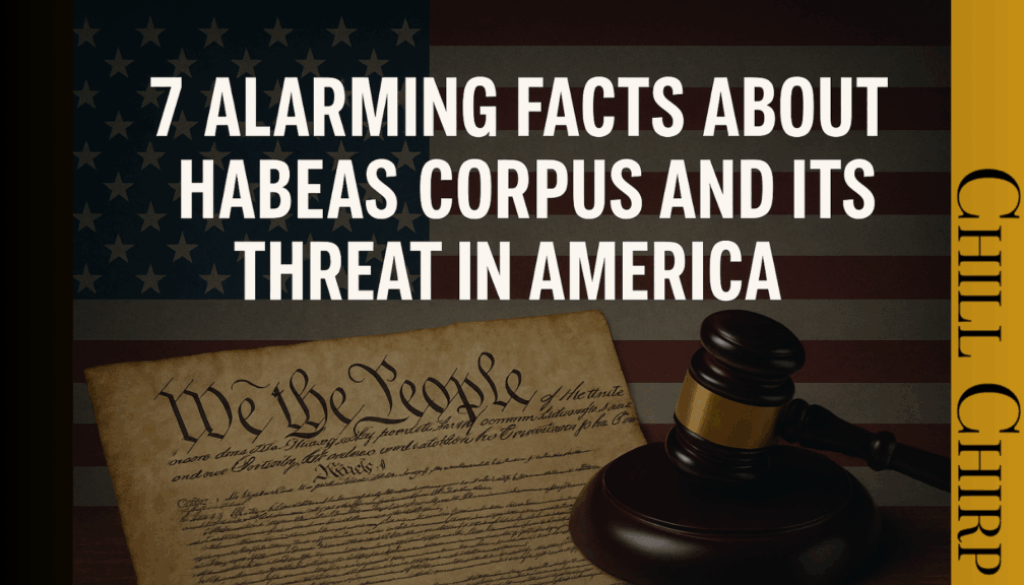Habeas Corpus in Danger: 7 Shocking Facts You Must Know
What Is Habeas Corpus and Why It Matters More Than Ever
Habeas corpus is often described as the cornerstone of individual liberty. But in recent times, it’s becoming a flashpoint in heated legal and political debates. From Trump-era policy changes to constitutional crises, this ancient legal protection is facing modern threats that every American should understand.
This article explores the legal meaning, historical significance, and current controversies around this critical concept.
1. What Is Habeas Corpus?
The term habeas corpus, Latin for “you shall have the body,” refers to a legal writ through which individuals can challenge unlawful detention. In practical terms, it gives someone in custody the right to appear before a judge to determine whether their imprisonment is lawful.
It’s a vital safeguard in democratic societies and one of the most enduring principles in both British and American legal systems.
Key Points:
- Allows detainees to demand a court hearing.
- Prevents unlawful imprisonment without trial.
- Enshrined in the U.S. Constitution under Article I, Section 9.
2. Constitutional Roots: Where It Stands
The U.S. Constitution protects the writ with one major exception:
“The privilege of the writ of habeas corpus shall not be suspended, unless when in cases of rebellion or invasion the public safety may require it.”
Historically, the writ has only been suspended during times of great national crisis—such as the Civil War. Its inclusion in the Constitution underscores how central it is to the American legal tradition.
3. The Trump Era and Civil Liberties Challenges
During Donald Trump’s presidency, concerns grew around the erosion of civil liberties. Policy advisor Stephen Miller played a pivotal role in aggressive immigration policies, which critics argue blurred the lines of constitutional protections.
Some legal analysts claim there were attempts to undermine fundamental rights—particularly involving indefinite detentions and controversial border control tactics.
Trending Keywords:
- Trump habeas corpus
- Stephen Miller habeas corpus
- Habeas corpus suspended
4. Is This Legal Right Being Undermined?
Although not officially suspended, the principles behind this legal safeguard have faced indirect challenges:
- Use of military tribunals for detainees at Guantanamo Bay.
- Immigration enforcement detaining individuals without timely hearings.
- National security justifications overriding individual legal rights.
These developments have sparked debates on whether the spirit of habeas corpus is being quietly eroded.
5. Legal Battles and the Supreme Court
The Supreme Court has heard several pivotal cases on this issue:
Landmark Rulings:
- Boumediene v. Bush (2008): Recognized detainees at Guantanamo Bay have the right to challenge their detention.
- Hamdi v. Rumsfeld (2004): Affirmed the right of U.S. citizens to contest their status as enemy combatants.
These decisions reaffirm the judiciary’s role in upholding fundamental liberties—even during times of national emergency.
6. Why This Issue Is Trending in 2025
Increased attention to this topic is due to:
- Political polarization and debates over executive power.
- Rising concerns about the rights of immigrants and detainees.
- Trending misinformation about what suspension actually means.
Recent surges in Google Trends for terms like “writ of habeas corpus,” “Stephen Miller habeas corpus,” and “habeas corpus constitution” reveal public interest in civil liberties and constitutional law is growing.
7. What It Means for You: Your Rights Explained
Every U.S. citizen should understand their rights under this critical protection:
You Have the Right To:
- Be informed of the reason for your arrest.
- Appear before a judge within a reasonable time.
- Challenge the legality of your detention.
But Also:
- Stay aware of changes in federal policies.
- Know how courts are ruling on related cases.
- Recognize attempts to erode constitutional norms.
📌 Frequently Asked Questions
What does “habeas corpus” mean in simple terms?
It means your right to challenge being held in jail. If arrested, you can ask a judge to decide if the detention is legal.
Has habeas corpus ever been suspended in the U.S.?
Yes, most notably by Abraham Lincoln during the Civil War.
Can habeas corpus be suspended again?
Yes, during times of rebellion or invasion — but only if Congress allows it.
Why is habeas corpus trending in 2025?
Controversial political proposals and legal debates have revived public interest and concern.
You may also like:
- Trump Orders Alcatraz Reopening for Nation’s Worst Criminals
- Sanobar Massacre: Alawite Civilians Targeted in Syria Attack
📣 Final Thoughts & Call to Action
Habeas corpus is more than a legal term — it’s a safeguard of liberty. As Americans face shifting political landscapes, it’s vital to remain informed and vigilant.
👉 Share this article to spread awareness.
👉 Comment below: Do you think habeas corpus is at risk?
👉 Subscribe to our blog for more civil liberties content.



